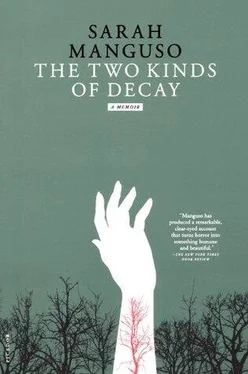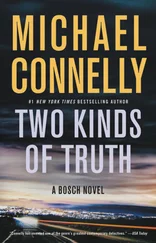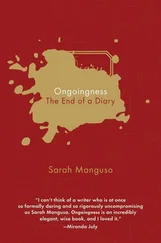If I broke a toe or lacerated my palm, it was apparently assumed I’d report the pain as numbness because I’d become accustomed to calling my discomfort numbness.
A doctor listened to my belly through his stethoscope and declared gastric unrest, though there is always some unrest in the bellies of the living.
I was prescribed a few tablespoons of liquid antacid. I drank it and the symptom abated a little, maybe.
And so the sensory changes had been caused, of course, by the antacid, just as the symptom had been caused by indigestion, and just as the indigestion had been caused by my having lain on my back for so long.
But not really.
The next time you have some sensory nerve damage, touch the paresthetic skin and evaluate its numbness.
Wait a minute. Then touch the skin again.
Wait another minute, then touch it again. Again. Wait an hour. Two hours, ten hours, a day, two days.
Is the numbness changing? Getting bigger, smaller, stronger, weaker? What have you done in the last four days? Sometimes potassium deficiency causes paresthesia. Have you eaten many bananas in the last four days? Go to the store and buy six bananas and eat them in the space of a morning. And feel that, yes, the numbness is disappearing! Since digesting most of the six bananas, your hands now feel a softer version of the soft quilt you have been lying under!
The world, with its infinite variables, is the wrong place to attempt implementing the scientific method. Most successful experiments work only in vacuums. Boyle’s law, Newtonian mechanics — only in vacuums are they true.
Narratives in which one thing follows from the previous thing are usually imaginary.
Everything that happens, happens in a moment that follows from all the other moments in spacetime.
As I see it, that’s the main problem with neurological symptoms that can’t be measured in numbers yet, and why many of my symptoms weren’t treated.
Those symptoms weren’t treated because they were unlikely enough to be virtually impossible. My reports of them were their only observable evidence.
My symptoms were so unlikely, by the book, that despite my reports of them, they were assumed not to exist.
After my first hospitalization I was sent home with a prescription for three physical therapy sessions per week at the local rehabilitation center. I was all better.
My physical therapist asked me what I wanted to be able to do, and I tried to think of the hardest thing I’d been able to do before I’d got sick. I said run three miles.
The therapist knew how to strengthen each muscle that had been weakened by the rogue antibodies in my blood, and she took a few minutes to record the strength of each muscle and to write a detailed plan, and then she explained the plan to me.
All I remember of her plan is that she pronounced the word strength as shtrenth. Over and over.
I got on the treadmill, but I had foot drop — my feet slapped down because I was too weak to dorsiflex, to turn my ankle and toes upward — and so I stomped with flat feet. Marched. And tripped a lot. I was going one mile per hour. The first day, I walked for five minutes. Eighty-three thousandths of a mile.
I stayed on the young therapist’s rehabilitation plan for one week, getting weaker instead of stronger, and then, eleven days after being discharged, I wound up back in the hospital.
I did eventually run three miles, but it took nine years.
Unused to being frail, I returned to college and stayed up very late that first night reading mail and writing papers and cleaning out the refrigerator, and in the morning I lay in bed vomiting into the wastepaper basket from fatigue, and less than two weeks later I was back in the hospital.
My disease has two steps: the immune system secretes antibodies into the blood. Then the blood delivers the antibodies to the peripheral neurons.
The antibodies destroy the neurons. First they eat away the cells’ myelin sheaths, then they eat away the cells themselves, which heal more slowly, if at all.
And so I had a nerve doctor and a blood doctor.
The stereotype for hematology/oncology specialists, or hemoncs (pronounced almost like he-monks )? They are the self-styled St. Judes, patrons of useless causes.
My hem-onc was special. He was from Norway. And he didn’t mind sitting in my wheelchair if it were nearer my bed than the armchair.
He told me that he and one of his terminal patients played a game every day he visited the patient at the hospice. The hem-onc brought music recordings with him, and he’d try to stump the terminal patient, who knew a lot about classical music. Like, with the slow movement of one of the less famous of Mozart’s piano sonatas. And the terminal patient, who had a lot of records with him, would usually guess correctly what the piece was, and then he would try to stump the hem-onc.
The hem-onc visited his terminal patient first thing in the morning, then visited me, and then saw the rest of his patients.
He had a daughter about my age, and their relationship was not good, and it troubled him. She was a lesbian, and he didn’t know how to talk to a teenaged lesbian daughter.
Talking to me was easy for him. He knew how to talk to people with blood diseases.
One day he told me his terminal patient, the one with all the classical records, had died.
How many other terminal patients did he have? How many deaths had my hem-onc witnessed? Did he feel like a failure when his patients died? And by that metric, what case isn’t a failure, in the end?
What metric is used instead of immortality to judge the success of a hem-onc?
My first central line was implanted in the middle of the night. I needed apheresis right away, and my arm veins were finally blown. That’s a clinical term. They had scarred and narrowed. I still have my tracks. I should have been given a central line earlier, but every apheresis session was declared the last one I’d ever need, so it was a while before anyone noticed it was time to get serious.
Central lines flow through a catheter into a large vein, usually the vena cava. Central lines can deliver more toxic fluids that would irritate smaller veins, and they have room to contain multiple lumens, and they can deliver fluids faster, as the heart distributes them immediately.
My hematologist asked me if I wanted my parents there while it was implanted, and though I’d never have thought of bothering them in the middle of the night, I thought he was telling me that getting a central line was something that one’s parents were supposed to be there for, so I said sure . And so my parents came to watch me get my first central line implanted.
My hematologist might have thought I’d wanted my parents there to help me feel less fearful, but I didn’t know enough about the procedure to feel fearful. Yet I was old enough to have known that watching their child have vascular surgery isn’t something parents should do.
I didn’t have to watch. I was on my back, and the Sikh doctor, who attached his surgical mask behind his head with a bent paper clip, as the tops of his ears were tucked under his white turban, jabbed away at my subclavian vein.
I’d been told I’d be injected with lidocaine, and that a needle would be stuck into my subclavian vein at a point just below my collarbone, and that while the needle was in the vein, a tube would be threaded over it and pushed down, through my skin, and through the hole in the vein, and deep into the vein, over the needle, and that the tube would be taped (and later sewn) to my skin, and that the needle would then be withdrawn, leaving the tube in place.
Читать дальше












